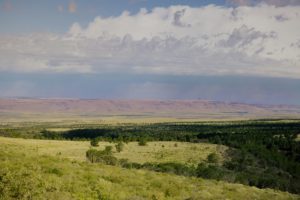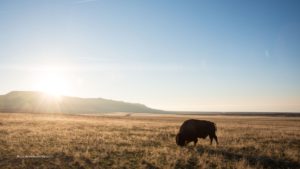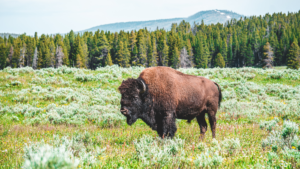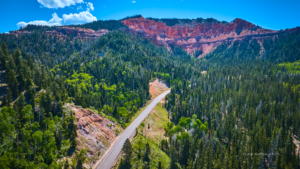For Immediate Release, April 4, 2019
Contacts:
Diane Summers, The Humane Society of the United States, (301) 721-6421, ashapiro@humanesociety.org
Bonnie Rice, Sierra Club, (406) 640-2857, bonnie.rice@sierraclub.org
Collette Adkins, Center for Biological Diversity, (651) 955-3821, cadkins@biologicaldiversity.org
Taylor Jones, WildEarth Guardians, (720) 443-2615, tjones@wildearthguardians.org
Kristin Combs, Wyoming Wildlife Advocates, (307) 413-4116, kristin@wyowild.org
Josh Osher, Western Watersheds Project, (406) 830-3099, josh@westernwatersheds.org
Zack Strong, Natural Resources Defense Council, (406) 556-9302, zstrong@nrdc.org
Proposal would save human, grizzly bear lives
JACKSON, Wyoming, and VICTOR, Idaho (April 4, 2019)—A coalition of organizations today submitted petitions to the Wyoming Game and Fish Commission and the Idaho Fish and Game Commission proposing rules to require hunters in grizzly bear habitat to carry bear spray. The proposals follow years of high grizzly bear mortalities due to hunter-related conflicts.
“Wyoming and Idaho have an opportunity to adopt a common-sense policy that will protect bears and hunters alike,” said Nicholas Arrivo, a staff attorney at the Humane Society of the United States. “The evidence that bear spray works is overwhelming, and the time to enact this life-saving proposal is now.”
Although grizzly bear conflicts with people remain relatively rare, data shows increasing numbers of conflicts between grizzly bears and humans during the fall hunting season as grizzly bears are drawn to gut piles left by hunters or come face to face with hunters in surprise encounters. Researchers and wildlife managers overwhelmingly agree that bear spray is the most effective means of deterring bear attacks and preventing human injury when encounters occur.
“Bear spray has been proven time and time again to be the most effective tool in preventing injury to both people and bears in close encounters, including hunting conflicts,” said Bonnie Rice, senior representative for the Sierra Club’s Our Wild America Campaign. “It’s common sense to require hunters to carry bear spray, and agencies should act now to make it mandatory.”
In recent years, Yellowstone’s grizzly bears have suffered record levels of human-caused mortality. As of 2017, the 15 bears fatally shot during encounters with hunters represent the leading human cause of grizzly bear mortality in the Greater Yellowstone Ecosystem, eclipsing the previous highest cause of grizzly bear death – lethal removals for livestock losses. Most human injuries caused by grizzly bears occur during encounters with hunters.
Mandatory bear spray could prevent these unnecessary casualties. Peer-reviewed studies have shown that bear spray is 98 percent effective at preventing human injuries during bear encounters. Firearms are only 50 percent effective.
“Some have suggested that a gunshot during hunting season is like a dinner bell to a grizzly bear, at a time when bears are filling their bellies before denning,” said Andrea Santarsiere, a senior attorney at the Center for Biological Diversity. “A mandate requiring hunters to carry bear spray would save the lives of people and bears.”
“This common-sense safety measure is akin to requiring a helmet when riding a bike,” said Taylor Jones, endangered species advocate for WildEarth Guardians. “We know it works, and we know it saves lives, so it should be standard practice.”
“It’s clear and simple; bear spray works,” said Kristin Combs, executive director for Wyoming Wildlife Advocates. “Hunters are extremely vulnerable, especially deep in bear habitat precisely when the animals are actively searching for food. This one easy practice will undoubtedly save the lives of both humans and bears.”
“There is still a lot of work to be done before grizzly bear conservation can be called a success,” said Josh Osher, public policy director for Western Watersheds Project. “Reducing bear mortalities and human injury by requiring hunters to carry bear spray is an obvious and effective policy with no downside.”
###
The Humane Society of the United States is the most effective animal protection organization, as rated by our peers. For more than 60 years, we have celebrated the protection of all animals and confronted all forms of cruelty. We and our affiliates are the nation’s largest provider of hands-on services for animals, caring for more than 100,000 animals each year, and we prevent cruelty to millions more through our advocacy campaigns. Read about our more than 60 years of transformational change for animals and people. HumaneSociety.org
The Sierra Club is America’s largest and most influential grassroots environmental organization, with more than 3.5 million members and supporters nationwide. In addition to creating opportunities for people of all ages, levels and locations to have meaningful outdoor experiences, the Sierra Club works to safeguard the health of our communities, protect wildlife, and preserve our remaining wild places through grassroots activism, public education, lobbying, and litigation. For more information, visit https://www.sierraclub.org.
The Center for Biological Diversity is a national, nonprofit conservation organization with more than 1.6 million members and online activists dedicated to the protection of endangered species and wild places. www.biologicaldiversity.org.
Wyoming Wildlife Advocates is a nonprofit organization focused on informing, educating, and empowering communities to preserve our wild legacy and protect our shared wildlife resources. We envision a Wyoming that leads the nation in exceptional and innovative wildlife management; all stakeholders are valued equally, and management decisions are driven by the best available science. Headquartered in Jackson, Wyoming, WWA has thousands of supporters in Wyoming, the Greater Yellowstone Ecosystem, and nationwide. www.wyowild.org
WildEarth Guardians is a West-wide nonprofit conservation organization whose mission is to protect and restore the wildlife, wild places, wild rivers, and health of the American West. www.wildearthguardians.org
Western Watersheds Project is a nonprofit environmental organization that works to protect and restore watersheds and wildlife throughout the West.






